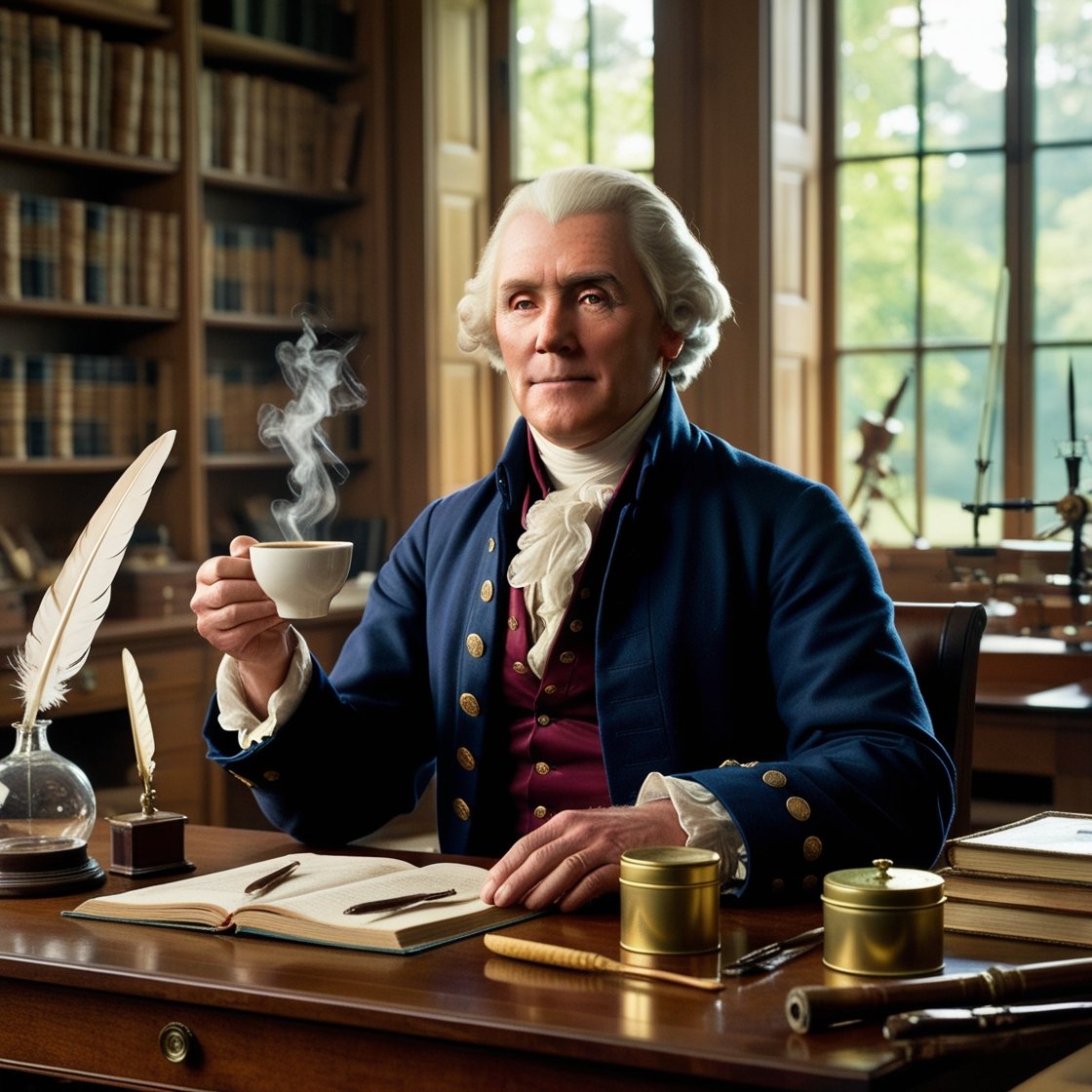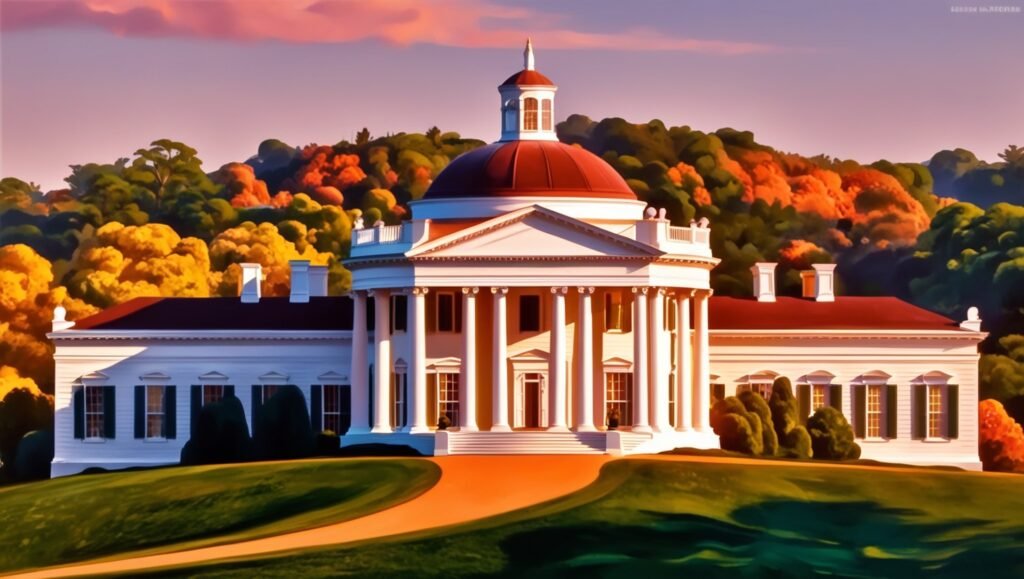Exploring Monticello, Thomas Jefferson, and the Iconic Coffee Canister
Monticello, Thomas Jefferson’s iconic estate, is a treasure trove of American history and a reflection of the third president’s ingenuity, intellect, and profound interests. Among the many fascinating items in Jefferson’s estate is a curious yet significant artifact: a coffee canister. This object, though seemingly ordinary, offers a glimpse into Jefferson’s lifestyle, thoughts, and even the role coffee played in early American society.
In this blog, we’ll delve into Monticello’s unique history, explore Jefferson’s connection to coffee, and examine the famous quote attributed to him regarding this beloved beverage, let’s unravel the story of Jefferson, his coffee canister, and its broader cultural implications.
1. Monticello: A Legacy of Innovation and Enlightenment
Monticello, perched atop a hill in Charlottesville, Virginia, is more than just a home. Designed by Thomas Jefferson himself, this architectural marvel blends neoclassical aesthetics with innovative design. Constructed over 40 years, Monticello reflects Jefferson’s passion for architecture, science, and self-sufficiency.
A Visionary Home
Jefferson’s love for knowledge is evident in Monticello’s unique features, such as the dome-shaped roof, hidden staircases, and strategically placed skylights. Monticello also served as a working plantation and experimental farm, showcasing Jefferson’s belief in the agrarian lifestyle.Artifacts of Monticello
The estate holds countless artifacts, from Jefferson’s inventions to everyday items like his coffee canister. Each piece tells a story, encapsulating Jefferson’s ideals and his quest for practicality and refinement.
Jefferson’s meticulous documentation of daily life at Monticello adds a layer of authenticity. From his detailed records of crops and weather to his musings on philosophy and governance, every facet of Monticello serves as a portal to Jefferson’s multifaceted world.
2. Thomas Jefferson and the Coffee Culture of His Time
Thomas Jefferson famously stated, “Coffee—the favorite drink of the civilized world.” This statement not only underscores his love for coffee but also hints at its symbolic value during the 18th century. Coffee was more than a drink; it was a social catalyst, intellectual stimulant, and a marker of sophistication.
Jefferson’s Personal Connection to Coffee
Jefferson first encountered coffee during his travels in Europe. Impressed by its widespread use in salons and intellectual circles, he became a connoisseur, bringing coffee culture back to Monticello. His estate featured imported beans, specialized brewing equipment, and, of course, the coffee canister that ensured freshness.
- A Ritual of Refinement
Jefferson’s coffee routine was deliberate and refined. He brewed coffee every morning, often experimenting with different methods and blends. The coffee canister played a crucial role in preserving the quality of his beans, symbolizing his commitment to excellence.
Coffee in 18th-Century America
In Jefferson’s era, coffeehouses were hubs of political discourse and innovation. They bridged the gap between different social classes and fostered the exchange of revolutionary ideas. By embracing coffee, Jefferson aligned himself with the intellectual and cultural currents of his time.
- A Symbol of Civilization
The phrase “the favorite drink of the civilized world” reflects the Enlightenment values Jefferson cherished—rationality, sociability, and progress. Coffee, with its invigorating properties, became synonymous with these ideals.
3. The Significance of Jefferson’s Coffee Canister

The coffee canister at Monticello isn’t just a storage vessel; it’s a piece of history that embodies Jefferson’s values and lifestyle. Made of tin or ceramic, the canister was designed to keep coffee fresh, protecting it from air and moisture. Its existence at Monticello reveals much about Jefferson’s attention to detail and his appreciation for fine things.
A Testament to Jefferson’s Practicality
Jefferson’s coffee canister exemplifies his belief in combining utility with elegance. Every object in Monticello was carefully chosen to serve a purpose while enhancing the overall aesthetic of his home.
Preserving History
Today, the coffee canister stands as a symbol of Jefferson’s personal and cultural legacy. It represents his forward-thinking approach to daily living and his role in popularizing coffee in America.
- Educational Value
Visitors to Monticello can view the coffee canister as part of the estate’s extensive exhibits. This humble artifact invites discussions about Jefferson’s domestic habits, the global trade of coffee, and the social rituals of early America.
4. Jefferson’s Coffee Quote: A Timeless Reflection
Jefferson’s declaration, “Coffee—the favorite drink of the civilized world,” resonates even today. It encapsulates the universal appeal of coffee, transcending time and culture. But beyond the beverage itself, the quote reveals Jefferson’s insight into human nature and social dynamics.
A Modern Perspective
In the 21st century, coffee remains a symbol of connection and productivity. Jefferson’s sentiment highlights how coffee continues to unite people across the globe, from bustling cafes to quiet moments at home.
- A Legacy in a Cup
Jefferson’s advocacy for coffee reflects his progressive thinking and ability to embrace global influences. His coffee canister, paired with this iconic quote, reminds us of the power of small rituals in shaping history.
5. Why Monticello, Jefferson, and Coffee Matter Today
Monticello isn’t just a historical site; it’s a living museum that inspires innovation and curiosity. Jefferson’s connection to coffee adds a personal touch to his larger-than-life persona, making him more relatable to modern audiences.
Lessons from Monticello
- Appreciation for Simplicity: Objects like the coffee canister remind us that even the simplest tools can hold profound significance.
- The Role of Rituals: Jefferson’s coffee routine underscores the importance of daily habits in fostering creativity and focus.
- Cultural Bridges: Coffee serves as a metaphor for the exchange of ideas, a theme central to Jefferson’s vision for America.
By exploring Monticello and its artifacts, we gain a deeper understanding of Thomas Jefferson not just as a statesman but as a human being with relatable tastes and routines.
Conclusion
Monticello, Thomas Jefferson’s quote on coffee, and his coffee canister together weave a story of intellectual curiosity, cultural exchange, and personal refinement. These elements remind us that history is not just about grand events but also the everyday moments that define us. Jefferson’s legacy, much like his morning cup of coffee, continues to inspire and energize generations.
Whether you’re a history buff, a coffee enthusiast, or someone looking to connect with the past, Jefferson’s world at Monticello offers something for everyone. So, next time you sip your favorite brew, think of Jefferson and his timeless words: “Coffee the favorite drink of the civilized world.”
Related Posts

